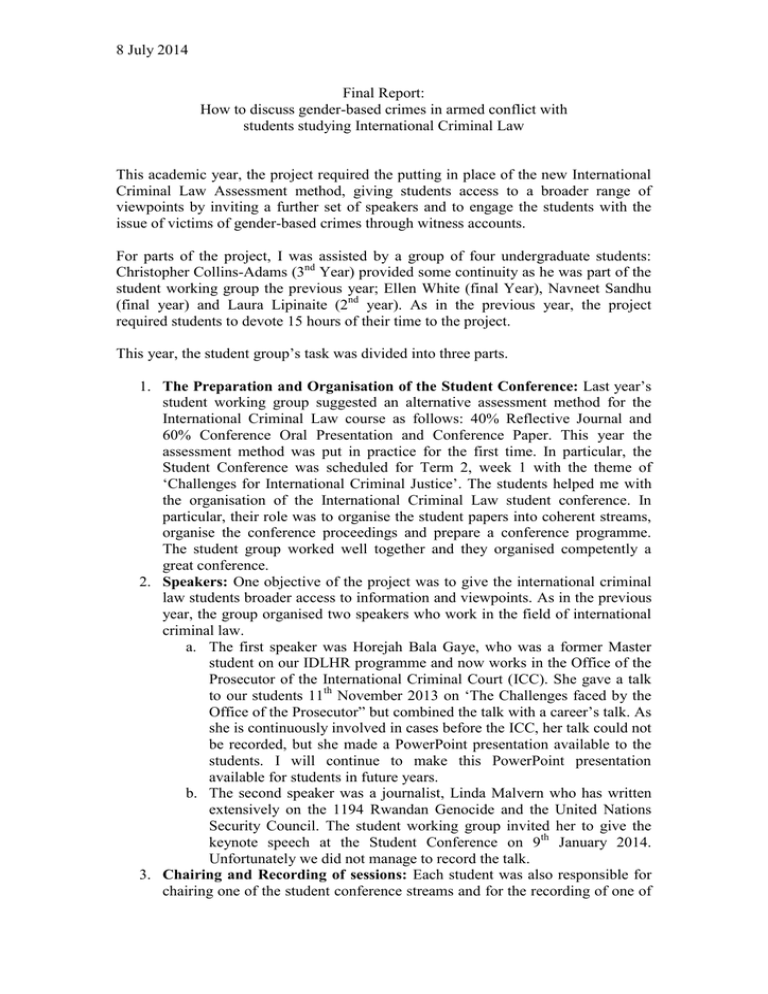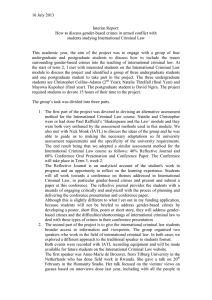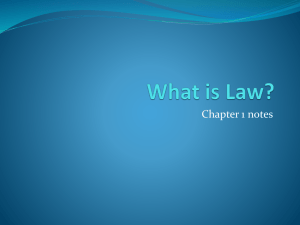8 July 2014 Final Report: students studying International Criminal Law
advertisement

8 July 2014 Final Report: How to discuss gender-based crimes in armed conflict with students studying International Criminal Law This academic year, the project required the putting in place of the new International Criminal Law Assessment method, giving students access to a broader range of viewpoints by inviting a further set of speakers and to engage the students with the issue of victims of gender-based crimes through witness accounts. For parts of the project, I was assisted by a group of four undergraduate students: Christopher Collins-Adams (3nd Year) provided some continuity as he was part of the student working group the previous year; Ellen White (final Year), Navneet Sandhu (final year) and Laura Lipinaite (2nd year). As in the previous year, the project required students to devote 15 hours of their time to the project. This year, the student group’s task was divided into three parts. 1. The Preparation and Organisation of the Student Conference: Last year’s student working group suggested an alternative assessment method for the International Criminal Law course as follows: 40% Reflective Journal and 60% Conference Oral Presentation and Conference Paper. This year the assessment method was put in practice for the first time. In particular, the Student Conference was scheduled for Term 2, week 1 with the theme of ‘Challenges for International Criminal Justice’. The students helped me with the organisation of the International Criminal Law student conference. In particular, their role was to organise the student papers into coherent streams, organise the conference proceedings and prepare a conference programme. The student group worked well together and they organised competently a great conference. 2. Speakers: One objective of the project was to give the international criminal law students broader access to information and viewpoints. As in the previous year, the group organised two speakers who work in the field of international criminal law. a. The first speaker was Horejah Bala Gaye, who was a former Master student on our IDLHR programme and now works in the Office of the Prosecutor of the International Criminal Court (ICC). She gave a talk to our students 11th November 2013 on ‘The Challenges faced by the Office of the Prosecutor” but combined the talk with a career’s talk. As she is continuously involved in cases before the ICC, her talk could not be recorded, but she made a PowerPoint presentation available to the students. I will continue to make this PowerPoint presentation available for students in future years. b. The second speaker was a journalist, Linda Malvern who has written extensively on the 1194 Rwandan Genocide and the United Nations Security Council. The student working group invited her to give the keynote speech at the Student Conference on 9th January 2014. Unfortunately we did not manage to record the talk. 3. Chairing and Recording of sessions: Each student was also responsible for chairing one of the student conference streams and for the recording of one of 8 July 2014 the student streams. Again, I was impressed by their confidence and competence in carrying out these tasks. The new assessment method for International Criminal Law also included a Reflective Journal. I was fortunate enough that Nick Monk (IATL) was able to come and talk to the students about his experiences of Reflective Journals and to show the students some examples of students’ reflective journals. On the whole, students have taken on board the comments and information that I provided. They have submitted some really good reflective journals. The third part of the project involved the researching and recording of witness accounts of gender-based crimes. This year, I have used the recordings. I devoted the final seminar of the International Criminal Law course to reflect on victims of gender-based crimes’ experiences of International Criminal Justice Each of the three seminar groups were asked to gather in the WAC, to have their phones and headsets with them ready to download the sound clip of witness recordings and to listen to these whilst wondering around the WAC at their own pace. After 10 minutes we gathered in the WAC to discuss critically what the shortcomings were and tentative solutions. This seminar enabled me to remind the students that these are real people having suffered horrendous crimes. Feedback from students was extremely positive and I will use this technique and space again to teach in the future. I have thoroughly enjoyed the opportunity to re-think my teaching of International Criminal Law. I have found student input positive and I believe that the assessment methods and different teaching techniques have made the module a better one. Solange Mouthaan





